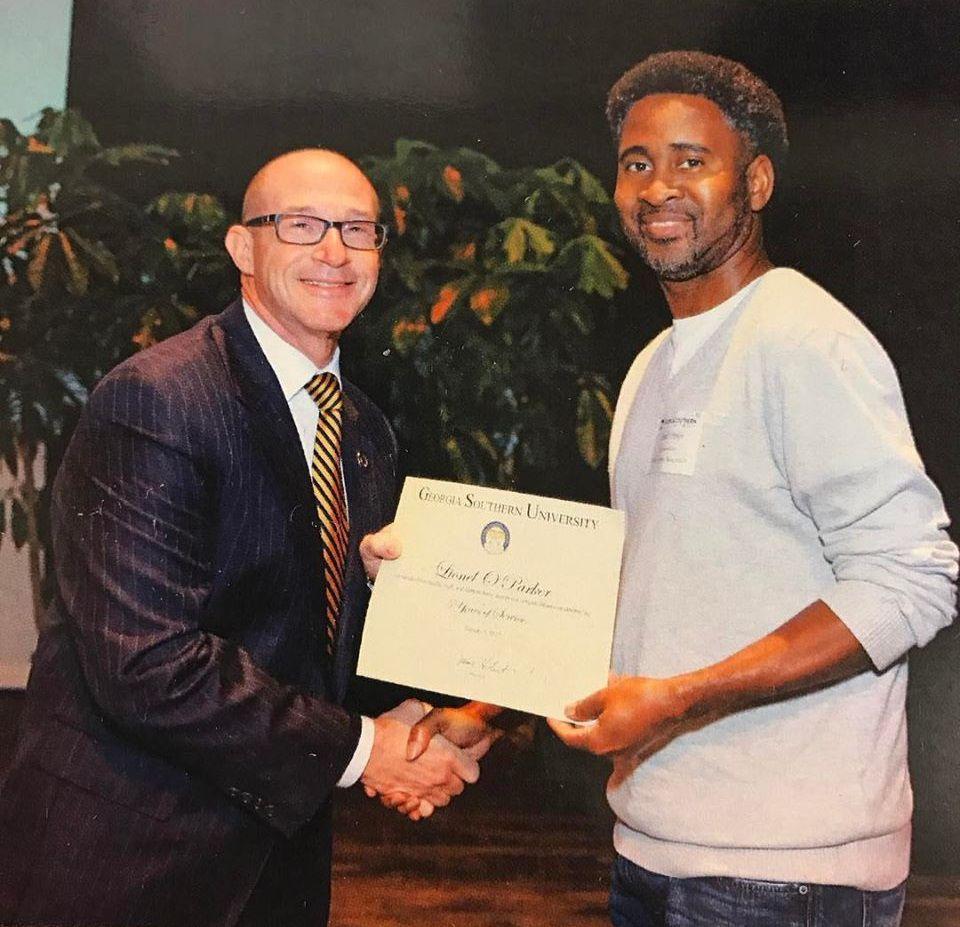Deaf library worker comments on university’s lack of accessibility resources
September 6, 2018
Hidden between the countless shelves of books in Henderson Library is Lionel Orlando Parker.
Patrons may notice him going in and out of his office behind the circulatory desk, or on the third-floor shelving returned and borrowed books. They may also notice that Parker is quiet, a tad reserved and just a bit aloof. Those who try to approach him will indeed be surprised when he brings out his cellphone or a sheet of paper and motions for them to write out their questions.
This behavior is simply because Parker is deaf, a condition brought on by a high fever he contracted when he was three. He has since used sign language, finger spelling and everyday technology to communicate in a world where roughly 28 million Americans, about 10 percent of the population, have some degree of hearing loss, according to the National Institute on Deafness and Other Communication Disorders.
After attending the School for the Deaf in Cave Springs, Georgia, Parker joined the Georgia Vocational Rehabilitation Agency, an organization that helps people with disabilities find employment. He was later hired as an interlibrary loan and shelving assistant at Henderson Library in 2007.
Although Parker learned sign language to communicate with the world, the world still struggles to communicate with him.
The art of communication
During his time at Georgia Southern University, Parker has known only a few people who know sign language. To communicate with his colleagues, he uses text messages or paper, but sometimes messy handwriting can stall or slow down the conversation.
“I try to communicate with people, but they don’t want to communicate with me because they won’t try to learn sign language,” Parker said via typed message.
Of the 28 million Americans that have some degree of hearing loss, about 2 million are classified as deaf, meaning they can’t hear everyday sounds or speech even with a hearing aid. An estimated 10 percent of these 2 million people were born deaf. The other 90 percent became deaf later in life.
Only a few of Parker’s co-workers, such as library assistant DeVanté Scott, have attempted to learn sign language to communicate with him.
“None of my co-workers would introduce me to him,” Scott said. “I just thought he was rude. Then when I found out he was deaf, I thought, ‘Wow, I’m the rude one.’”
Scott graduated in the spring and left his position at Henderson Library during the summer.
Issues in the workplace
The Americans with Disabilities Act prohibits discrimination on the basis of disability in employment and various other areas. Title I of the act states that employers with 15 or more employees must provide qualified individuals with disabilities an equal opportunity to benefit from the full range of employment-related opportunities available to others.
However, Scott said that Parker has been unable to attend staff meetings in his department due to a lack of accommodations and interpreters.
{{tncms-inline content=”<p>&ldquo;Most of the resources available to help people with disabilities are only available to students, not staff like Lionel,&rdquo; Scott said.</p>” id=”72fc5b45-b7ff-4b2f-9932-59a2fc4ff031″ style-type=”quote” title=”Scott Quote” type=”relcontent”}}
When asked about employee accommodations, the Henderson Library redirected The George-Anne to Jennifer Wise, GS marketing and communication director, who said in an email, “The university cannot comment on personal matters.”
Kelly Woodruff, director of the Student Accessibility Resource Center, said in an email that faculty and staff in need of accommodations would need to contact Human Resources.
An American Sign Language (ASL) club was introduced on campus in 2013, but lack of attendance and leadership had the club on and off hiatus, said Scott. The club became an official student organization in 2017 but was subsequently put on another hiatus in spring of 2017 following the graduation of former club president Dontonio Thomas.
“Unfortunately, I do not think that the ASL club is planning on coming back at the current moment,” Darius Larry, metadata quality manager for Henderson Library, said in an email.
Less than 20 colleges in the United States offer ASL as a course of study, excluding Georgia Southern.
{{tncms-inline content=”<ul> <li style="text-align: left;">American University</li> <li style="text-align: left;">Augustana College&nbsp;</li> <li class="clearfix" style="text-align: left;">Bloomsburg University of Pennsylvania</li> <li class="clearfix" style="text-align: left;">California State University &mdash; Northridge</li> <li class="clearfix" style="text-align: left;">Columbia College Chicago&nbsp;</li> <li class="clearfix" style="text-align: left;">Flagler College&nbsp;</li> <li class="clearfix" style="text-align: left;">Gallaudet University</li> <li class="clearfix" style="text-align: left;">Lenoir&ndash;Rhyne University</li> <li class="clearfix" style="text-align: left;">Lone Star College &mdash; Montgomery</li> <li class="clearfix" style="text-align: left;">McDaniel College</li> <li class="clearfix" style="text-align: left;">Quincy University</li> <li class="clearfix" style="text-align: left;">Rochester Institute of Technology</li> <li class="clearfix" style="text-align: left;">Santa Ana College</li> <li class="clearfix" style="text-align: left;">Tidewater Community College</li> <li class="clearfix" style="text-align: left;">University of Rochester</li> <li class="clearfix" style="text-align: left;">University of Southern Maine</li> <li class="clearfix" style="text-align: left;">Western Oregon University</li> <li class="clearfix" style="text-align: left;">William Woods University</li> <li class="clearfix" style="text-align: left;">Troy University&nbsp;</li> </ul> <p>List according to CollegeXpress.com.</p>” id=”e4630952-0854-40a0-a11f-4612959bf053″ style-type=”question” title=”The current colleges and universities you can earn American Sign Language at:” type=”relcontent”}}
Parker and Scott both hope that the GS senate resolution from January may allow the ASL course to be added to GS’ curriculum in the future.
“A lot of students have been asking for an ASL class, even if it was offered [only] once a semester,” Scott said. “People are naturally intrigued by deaf culture and want to learn more about it.”
Despite the lack of communication in his department, Lionel remains kind and courteous. He never turns away anyone who attempts to speak to him, nor is he impatient with anyone who tries to communicate with him via sign language.
“I do believe [people] can learn ASL because it is important for [the] lack of communication for deaf people,” Parker typed out on his phone. “I hope [GS] can get one good professor who can teach ASL one day.”
Shiann Sivell, The George-Anne Enterprise reporter, gaspecial@georgiasouthern.edu



